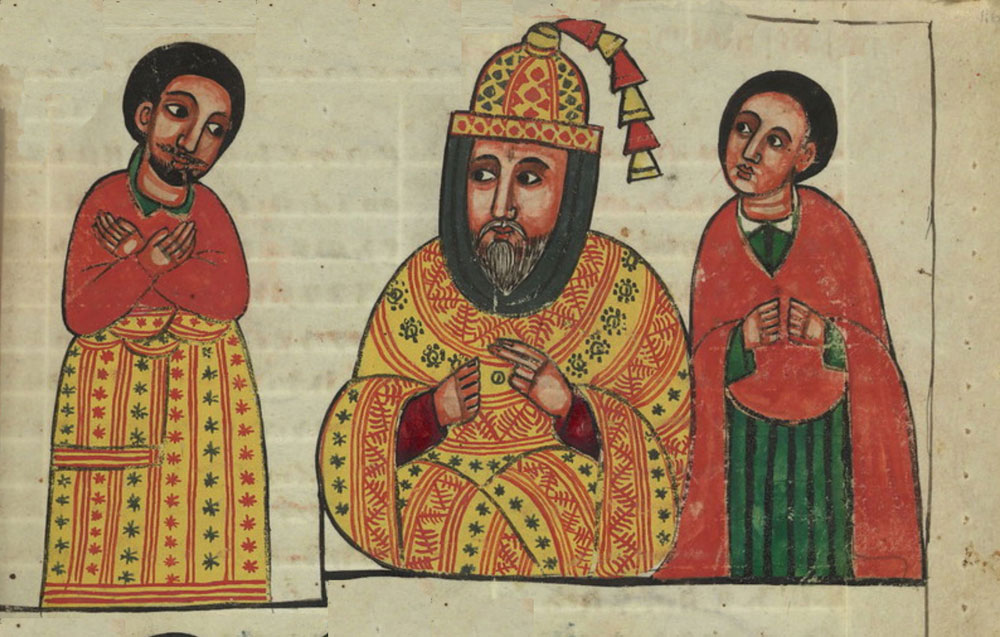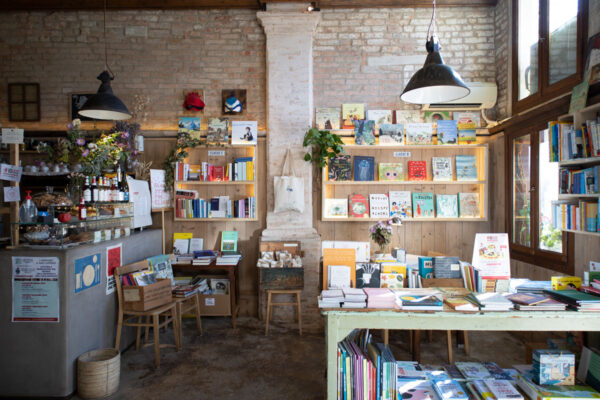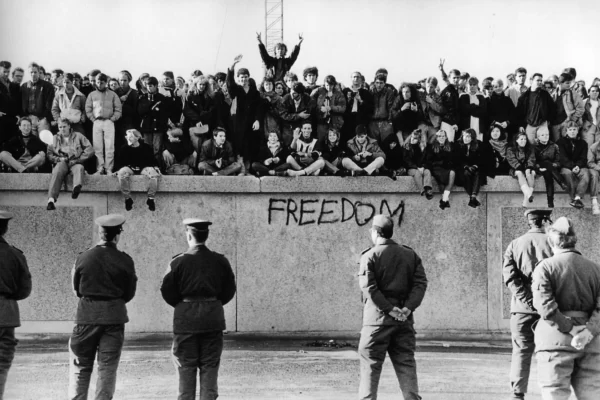Ribka Sibhatu, Aulò! Aulò! Aulò! Translated by André Naffis-Sahely from the Italian and from Italian translations of the Tigrinya and Amharic made by the author. (Poetry Translation Centre, 2020).
We are thankful to be able to offer to our reader a preview of Ribkha Sibhatu’s new collection of poems.
 The Exact Number of Stars
The Exact Number of Stars
Şїnşїwai! ‘I have a story to tell!’
Uāddëkoi şęlimai! ‘We’re ready, we’re listening!’
Once upon a time, when stones were made of ĥmbascā bread, there lived a tyrant who couldn’t suffer any threats to his power, and since this despot wanted to rid himself of any potential rivals, he issued an order decreeing that all the kingdom’s elders were to have their throats slit, seeing as how they were the only ones who could pose a threat to him, employing the wisdom they had inherited from their ancestors. And so the kingdom’s elders were slain. Only a single young man was able to save his father, building him an underground refuge where he could hide. When the murderers came looking for his father, the young man replied:
‘My father died many years ago. I was raised by my mother.’ Without insisting further, the tyrant’s men left.
After some time, the King called an assembly, at which he imposed a despotic demand on his subjects: ‘I order you to tell me the exact number of stars right now!’ When the king’s subjects heard this and understood how impossible it would be to oblige him, they grew very apprehensive. But the young man who’d saved his father immediately went to the latter’s refuge and called him:
‘Father!’
‘Tell me, my son.’
‘Today, the tyrant asked the impossible of us!’ he said. ‘What, my son?’
‘We must tell him the exact number of stars immediately.’ ‘Did he really ask such a thing?! Take heart, you’ll be able to give him the right answer!’
His father grabbed a wančia and filled it with a bunch of ţaff, which he then spilled into a goat skin.
‘Here, my son,’ he continued, ‘these grains of ţaff correspond to the exact number of stars. Deliver this goat skin to the King and tell him to count them. If there are more stars than grains, then we’ll submit to any punishment he desires.’
The young man rushed to the assembled villagers and relayed his father’s instructions, which were followed to the letter.
When the King saw what his subjects had brought him, he realized he’d been tricked. He was so embarrassed that it left him speechless.
The people were grateful to the young man for having saved the village. From that day on, his name was on everyone’s lips and the young man was routinely blessed for all the good he’d done his people.
But before too long, the King summoned another assembly and said:
‘I have a new request for you.’
‘What is it?’
‘You must bring me some bull’s milk!’
The subjects were appalled by this new request and, as they didn’t know who had really come up with the solution to their last problem, they went to find the young man. They brought him a number of gifts and begged him to solve this new enigma.
The young man went back to his father.
‘Father, today the king made another impossible request. We must bring him some bull’s milk!’
‘Don’t worry, my son,’ the old man replied, ‘Take one of our bulls, put him in an enclosure and keep him isolated. Deprive him of food and drink for seven days. On the eighth day, give him nothing to drink but milk. As soon as he’s finished drinking, bring him to the King so that he’ll pass the milk in front of his eyes. As you’ll see, he’ll pass nothing but milk!’
The village delegates executed the old man’s recommendation and told the King:
‘Here you are, your Majesty, we’ve brought you bull’s milk, just like you commanded.’
As soon as he’d been presented before the King, the bull started peeing milk. The King was astonished and regaled the village delegates with a sumptuous feast. All the while, he thought about what he might ask them next.
‘What could I possibly demand of them now?’
After long reflection, he called another assembly and said: ‘Hear me, my people. I want you to relocate my palace to a better spot, but I don’t want a single item to be disturbed! And I want the task completed by lunch time.’
‘Your wish is our command!’ the delegates replied in unison.
After he’d communicated this latest request, the king left and thought:
‘I’d like to see how they find a solution to this one!’
As agreed, the King went to meet the delegates at the appointed hour and, as he’d expected, found that his palace was exactly where he’d left it. He asked the delegates:
‘I asked you to move the entire palace, so why is it still in the same spot?’
‘Your Majesty,’ they replied, ‘We did move the palace, but as we didn’t know where to put it, we placed it back where it was! Besides, we’d like you to rest it on our shoulders!’
At that point, the King lost his patience and told the man who’d conveyed the answer:
‘You, come forward.’ Obeyed, he continued, ‘You were the one who brought me all those grains the first time; then you brought me a bull who peed milk and now you answered the most difficult question of all. There’s only one explanation for this: your father is still alive! Either you tell me the truth, or I’ll slice you in two with this sword.’
The young man replied:
‘If you promise you won’t kill me, I’ll tell you everything you want to know.’
Introduction by André Naffis-Sahely
Ribka Sibhatu was born in Asmara in 1962, the year Emperor Haile Selassie’s Ethiopia unilaterally annexed the former Italian colony of Eritrea, triggering a slow-burning liberation war that would last for the next three decades, with each of the then- superpowers, the US and the USSR, taking a side, turning the conflict into yet another Cold War proxy. In 1979, at the age of seventeen, Sibhatu was sentenced to ten months in prison for criticizing the government, on false charges trumped up by an Ethiopian politician whom Sibhatu had refused to marry. Upon her release, Sibhatu first took refuge at a relative’s house, then adopted a false identity, finally fleeing to Addis Ababa in 1981, where she completed her education. In 1986, Sibhatu married a Frenchman, relocating to his native country, and she began a new life in Lyon, where her daughter Sara was born. Once that marriage ended, Sibhatu moved again, this time to Rome, where she published her first collection of poems, Aulò! Canto poesia dall’Eritrea (Sinnos, 1993), a volume of confessional lyrics written in both Tigrinya and Italian.
As readers will note in the following pages, works such as ‘Virginity’ and ‘Prison Cells’ starkly yet deftly relay the experiences and traumas Sibhatu suffered during her youth, offering us a highly intimate personal history, whether in the moving elegy ‘My Abebà’, written in tribute to a cellmate killed during Sibhatu’s incarceration, or in the more light- hearted portrait of her daughter Sara at a young age in ‘African Grandmothers’. Nevertheless, this selection also includes more overtly political poems, which see Sibhatu reflecting not only on her own deracination, or the plight of refugees, but even the fate of the Chechen separatists who stormed the Dubrovka Theatre in Moscow during the 2002 hostage crisis. Although Sibhatu writes in Italian, Tigrinya and Amharic three of her five languages, the lost paradise of her native home always manages to sneak through, one way or the other. One may see this at work in ‘Lampedusa’, where the Tigrinya words of a desperate appeal to the Almighty tear through the fabric of the Italian original, a literal testament to Sibhatu’s commitment to preserving Eritrea’s culture heritage in exile.
Subject matter aside, what is clear to me about Sibhatu’s work is that the author’s uncompromising humanity is deeply embedded into each word, each poem of hers ultimately reconnecting us in both mind and heart to the wider human condition. I do not say this casually. On a visit to Lampedusa, roughly six months after 368 refugees drowned in the tragedy of 3 October 2013, Sibhatu painted the following picture of that southern island in an interview: ‘I was struck to see how that tragedy had changed the lives of the Lampedusans. They were powerless before the enormity of what had happened, they had seen piers strewn with corpses, but I think that this tragedy brought us closer together. Both the parties involved experienced that moment in an overwhelming and violent manner, and despite the distance between them, they’re both in mourning.’
Sibhatu’s long-standing engagement as both a scholar and an activist no doubt helped shape her poetic work. Following a master’s degree in literature and modern languages, Sibhatu then gained a PhD in communication studies from the Università degli Studi di Roma ‘La Sapienza’, later publishing her thesis, Il cittadino che non c’è: L’immigrazione nei media Italiani (Invisible Citizens: Representations of Immigration in the Italian Media, EDUP, 2004). Sibhatu worked as an inter- cultural mediator and consultant for Rome’s city council in the early 2000s and has served as a committee member for various Italian ministries.
In addition to her work as a lyric poet and human-rights activist, Sibhatu has devoted a considerable amount of her creative energies to the assemblage and recording of Eritrea’s folkloric canon, a body of oral literature which has been handed down through the ages in the form of ‘aulòs’ (literally ‘Please give me permission! I have something to say publicly in rhyme!’), the Tigrinya term for chant-poems, or bardic songs, that are performed at public and private celebrations, as well as during religious rites. Her decade-long efforts in keeping these traditions alive – in the midst of her country’s continuing unravelling and her work as one of the Eritrean diaspora’s most indefatigable voices – finally led to the publication of Il numero esatto delle stelle e altre fiabe eritree (Sinnos, 2012), the title story of which is featured here in this selection. In these ancient aulòs, performers always begin their tales by invoking the word, ‘Şїnşїwai’, which translates to, ‘I have a story to tell’, and to which the audience replies, ‘Uāddëkoi şęlimai’, or, ‘we’re ready, we’re listening’. During her youth, Sibhatu learned elements of this craft in Asmara, the capital, and Himbirti, her ancestral village in the high plateau, where these stories can be traced back for centuries. ‘How African Spirits Were Born’, also included in this selection, is popularly believed to be based on actual events and is thus performed without the usual introductory formula. Eritrean tradition holds that spirits can assume human forms and can be either benign or malign and benign; for instance, the latter are thought to reside in pools of water, where people bathe in order to purify themselves and cure their illnesses. To this day, many claim to have seen spirits wandering their homes or villages, which explains why many are afraid to walk alone at night, lest they fall victim to spirits less kindly inclined.
I first began to translate Sibhatu’s work in late 2010 and quickly found a warmly welcoming venue for this task when the PTC’s founder, Sarah Maguire, commissioned me to lead a number of workshops on Sibhatu’s wonderful poetry. As such, I am immensely pleased that the PTC decided to commission a small selection of my translations for their World Poet Series.
In her poem ‘Mother Tongue’ Sibhatu calls her five languages her stepdaughters and, over the past decade, I have received poems from her in Italian, Amharic, Tigrinya and French. The poems and fables included in this selection are presented first in their original language of composition, then in my English translation. The translstions worked from Sibhatu’s Italian versions of each work, or directly where the poem was composed in Italian. Although this is Ribka Sibhatu’s first full appearance in English, I sincerely hope it is only the first of many.
Image: Manuscript narrating the story of the Archangel Michael. Gondar, Rule of Emperor Zär’a Ya’eqob, 17th century. Walter Museum, Baltimore









